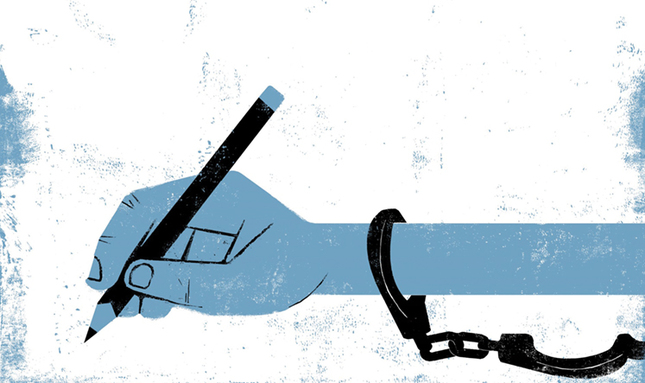
Edel Rodriguez

Edel Rodriguez
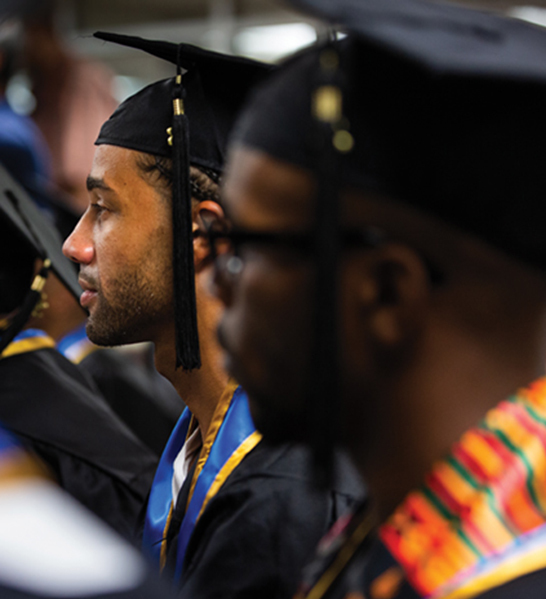
Karen Pearson
Evan Holmes (left) and Marcus Harvin (right) were among the seven students who received their associate degrees from the University of New Haven at the Yale Prison Education Initiative’s first commencement ceremony in June.
View full image

Karen Pearson
Evan Holmes (left) and Marcus Harvin (right) were among the seven students who received their associate degrees from the University of New Haven at the Yale Prison Education Initiative’s first commencement ceremony in June.
View full image
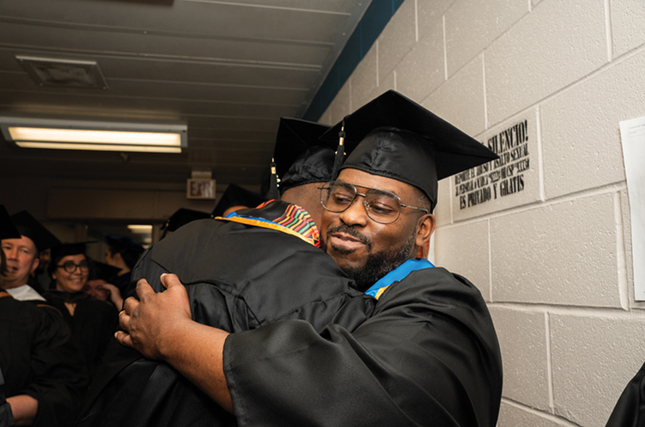
Karen Pearson
Maurice Blackwell embraced a fellow graduate before commencement.
View full image

Karen Pearson
Maurice Blackwell embraced a fellow graduate before commencement.
View full image
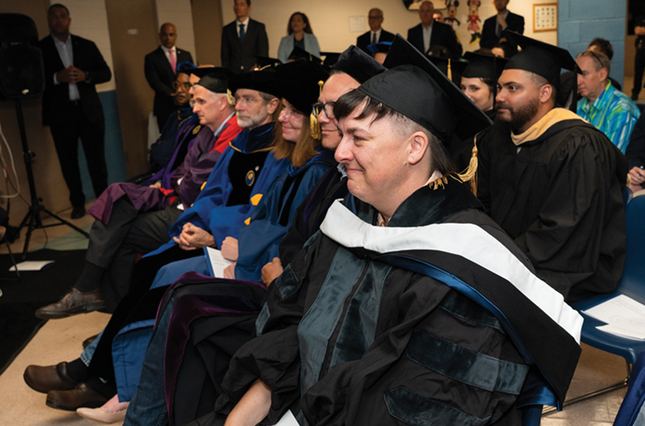
Karen Pearson
YPEI faculty members attended the ceremony to congratulate their students.
View full image

Karen Pearson
YPEI faculty members attended the ceremony to congratulate their students.
View full image
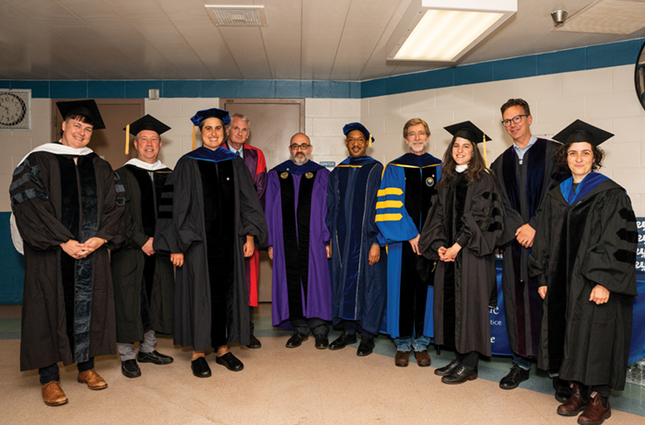
Karen Pearson
YPEI founder and director Zelda Roland ’08, ’16PhD (third from right), posed with Yale faculty—all of whom have taught in the program—at the commencement ceremony. From left to right are Greta LaFleur, Daniel HoSang, Mira Debs, Timothy Snyder, Paul North, Roderick Ferguson, Paul Tipton, Roland, Caleb Smith, and Talya Zemach-Bersin.
View full image

Karen Pearson
YPEI founder and director Zelda Roland ’08, ’16PhD (third from right), posed with Yale faculty—all of whom have taught in the program—at the commencement ceremony. From left to right are Greta LaFleur, Daniel HoSang, Mira Debs, Timothy Snyder, Paul North, Roderick Ferguson, Paul Tipton, Roland, Caleb Smith, and Talya Zemach-Bersin.
View full image
Everybody showed up to class in a khaki uniform. They followed similar paths getting there. Marcus Harvin lived on the second tier of his cell block, in the far corner. The corrections officer would buzz him out of his cell. Harvin would walk down a flight of steps and then to the desk to check in. The officer would buzz him through another door. Harvin would wait for that door to close and when it did, a second door was unlocked, then opened, and he would exit into a hallway carrying his books and pens. He would pass through a metal detector and ascend a staircase to the classroom. “In order to get to the place that opens all these doors to your future,” he said, “you first had to pass through so many locked doors.”
The classroom looked like any other classroom, and yet it exerted transformative power over the prison. It was a room far larger than the walls that contained it, a kind of endless coliseum in which the men—they were all men—presided over dueling ideas. They read history, literature, critical theory, sociology, art history, bioethics. Harvin, as he engaged with texts on colonialism, found himself becoming a black feminist. Though physically captive, the men could wander distantly in the world of thought.
Harvin had first enrolled in the Yale Prison Education Initiative in the summer of 2021. He’d been an inmate at MacDougall-Walker Correctional Institution when YPEI first arrived, in the summer of 2018, but he didn’t apply that year. Nearly half of the prison did: 600 men vying for twelve open spots.
At the time, Harvin was more interested in sorting out the legal troubles of friends and family. He helped a cellmate overturn a murder conviction. He wrote a letter to a judge advocating a favorable disposition for a close relative. He became a certified paralegal. “Then my grandmother, God rest her soul, Sally-Mae Harvin, she made me promise that I would go back to school and get a bachelor’s and go to law school,” Harvin says. He’d watched other men in the prison take part in YPEI. He’d seen the books they read, he’d overheard their conversations, “the quality of information they had. There are levels to education. Levels to access. And that program gives you so much more access than the average because Yale is a part of it, and that’s important. Your source is always going to determine your success.”
His grandmother died in February of 2021. He couldn’t let her down: he’d promised her a bachelor’s degree and law school. He applied to YPEI that spring and enrolled in the summer.
There were two courses on offer. English 120: Reading and Writing the Modern Essay—a hallmark of Yale’s English department—and Medicine and the Humanities. “English 120 wanted us to pump out four Yale-level essays in four weeks, so we knew this was going to be a heavy workload,” Harvin says, but he couldn’t resist taking the second class. He persuaded his closest friend, Alpha Jalloh, to enroll in Medicine and the Humanities with him.
“We got taught by a practicing medical doctor, Dr. Matt Morrison, who used to sit down right next to us—while we were in a maximum security prison—like we were his peers; not even his students, but his peers. Classes like that, experiences like that, will last a lifetime. That program right there literally affords every participant their personhood again. We’re used to being in a cage all day. But a classroom—that connotes education, and you only educate something you care about,” Harvin says. He was aware of the many different ways that his professors could have been spending their time, and yet they had chosen, on a summer day, to drive for an hour to teach classes to men who might never walk free, for whom a job outside of prison might be an impossibility. For students in YPEI, the readings, the coursework, the grades were not a means to an end, not a requirement to be fulfilled, not a way to pass time with friends, not an avenue to summer internships. There was nothing of utility besides the class itself.
“They are so avid about the reading that I have to be careful I’ve done it myself,” says Paul North, a professor of Germanic languages and literatures and chair of YPEI’s faculty advisory committee. “They’re real scholars. They turn these ideas over as if they’re of vital importance. To them, freedom of mind is an absolutely essential freedom.” He described a seminar he’d taught in which one group of men composed an alternative history of Tulsa, Oklahoma’s Black Wall Street. Suppose the neighborhood had not been destroyed by white violence. Suppose that the prosperous Black community had continued to thrive, to grow, and to become a model for other burgeoning Black communities and business districts around the country.
“That classroom,” North says, “was a space to use history to imagine other futures.”
So much of life turns on the accidental little moments fixing our fates. In early 2015, Zelda Roland ’08, ’16PhD, was in New Haven completing her dissertation when a college friend who happened to be running Wesleyan’s Center for Prison Education gave a call. All of the students who had volunteered to help with that semester’s study hall had backed out. Could Roland lend a hand? Eager for distraction, she agreed.
She had attended Yale as both an undergraduate and graduate student. She had taught classes as a TA and as a primary lecturer. Roland had spent a lot of time hanging around Yale and was familiar with the university’s academic vibrance. “When I first met those guys in that prison, they were the best students I’d ever sat down with,” she says.
Roland continued volunteering through 2015. Back in New Haven, she found likeminded people on campus. There were students volunteering as GED tutors in youth facilities and students who had themselves been incarcerated and wanted to connect with those still behind bars. There were professors who freely gave their time teaching in Wesleyan’s prison program or who drove hours into New York State to work with Bard’s prison initiative. All these efforts were noble and good, but they were tenuously connected, if at all, to the formal institution of Yale.
In March of 2016, Roland convened as many people from this group as she could. They discussed how to start a credit-bearing prison education program housed within the university. They agreed that Yale Summer Session, which gives credit to students who are neither matriculated at Yale nor pursuing a Yale degree, offered a nice opening. In theory, Yale could simply offer a summer session program in one of Connecticut’s prisons. Roland assembled a pitch and approached administrators.
“I thought I would tell Jonathan Holloway [’95PhD]—who was the dean of Yale College at the time—how to start a prison education program, tell him how great it would be, wish him good luck, and that would be it,” Roland says. She figured it would be running under somebody else’s capable supervision by June of 2016, and that she, having received her PhD, would be packing off to New York to start a teaching post at Columbia. “I was naive and optimistic.”
Those she met with suggested that building a program like YPEI would take years, if it succeeded at all. Peter Crumlish, the executive director of Dwight Hall, was thrilled by the idea, but like others, he counseled patience. He offered Roland a home at Dwight Hall to continue developing and building support for the idea. She wrote to Columbia and declined their offer, embarking instead on “a massive lobbying campaign.”
She talked, endlessly it seemed, with administrators at Yale. She met with employees of Wesleyan’s and Bard’s prison education programs, as well as graduates of the programs, to discuss the benefits and drawbacks of different models. She cold-called funders, less for the money—Bard had provided a seed grant—and more to demonstrate to Yale that people found value in a project like YPEI.
For two years, “so many meetings,” she says. And then, in the summer of 2018, YPEI underwent a change from idea to thing. The program piloted four classes, two at the Manson Youth Institution and two at MacDougall-Walker. Roland was no longer advocating for an imaginary group of students, but for real people. “It was a miracle,” she says. She recalls sitting down to start the registration process for the men’s netIDs. For Roland, it brought to mind that moment when she, years before, still a teenager, had received her Yale email address and the ethereal promise of acceptance solidified into a real identity.
“It changes your whole perspective,” Harvin says. “You start to say, ‘I’m a student. I’m in the Yale program.’ You’re not a prisoner any longer—you’re a person in prison. That’s still with me.”
But still: a person in prison.
The fact of prison presents distinct challenges. “In this environment, it’s extremely difficult to balance life in class with issues going on outside,” says Evan Holmes, who was part of YPEI’s inaugural 2018 class. “Throughout this entire thing I’ve lost three appeals. Each time I lose one it takes a bit longer to recover, and, at the same time, I’ve got to keep going. I lost this appeal on Thursday but I still need to turn in a five-page critical analysis on Monday. Okay. You bite down.”
Conducting research is also complicated. A pillar of YPEI, since its conception, has been strict adherence to on-campus standards. Classes follow the same syllabi. Students are graded with the same rigor. In-class discussions are held to the same expectations. As Roland said, nobody is given pity grades. Yet for several years after YPEI launched, Roland and volunteers were helping the students, as they drafted their papers, by printing out articles from sources like JSTOR and Wikipedia.
This changed in the fall of 2020, when Yale librarian Emily Horning asked Roland how she and her colleagues could help. Roland rattled off several wishes, but most pressing was constructing a conduit between the library’s vast collections and the men in MacDougall-Walker.
Horning established the research request network, which fields requests from students in YPEI and passes them to on-campus volunteers who are trained in basic library research. The volunteers—graduate and undergraduate students, along with several staff—then gather relevant materials in response to the request, bundle them, and ship them to the prison. About a hundred volunteers now work with the network. A YPEI student recently mailed Horning and the “Entire Research Request Network” a letter of thanks. “This information is life,” he wrote.
A $1.5 million grant from the Mellon Foundation, given to YPEI in April of 2021, has allowed the program to expand its ambition dramatically. The number of credit-bearing courses on offer has grown from four per year during the summer to over 30 year-round. YPEI has opened a second academic program at a federal women’s prison in Danbury, Connecticut, and it has created a fellowship for students coming home. Most significantly, a partnership with the University of New Haven allows YPEI students to work toward an associate degree in general studies and a bachelor’s degree in interdisciplinary studies. Degrees are awarded by the University of New Haven.
Harvin, who was released in 2022, was one of seven YPEI students to receive an associate degree this past spring. (The other six men remain at MacDougall-Walker.) Graduation was held inside the prison. There was “a divine energy in the room,” says Holmes. Governor Ned Lamont gave the commencement speech.
“That was the most amazing moment of my life, rivaled only by the day my daughters were born,” Harvin says. “We were shaking hands with the highest dignitary in the state as he introduced himself to us in a place where we would normally have to undergo strip searches because we had just gotten a visit from our loved ones.” He went on: “I was able to go back to the place where I was warehoused, where I was literally captive a year before, where I was not even able to hold my daughter’s hand, and I was able to hold my mom’s hand walking out of there. To go somewhere for failing and come back for succeeding is a beautiful thing.”
Astory like Harvin’s demonstrates, as Holmes put it, the “alchemical” property of a liberal arts education. Close reading, reflection, honest and fierce debate all serve to illuminate “the errors of your thinking,” Holmes says. “It pushes you to reach a more perfect state, which is paramount coming from this environment. Society needs to understand who it is they want released. Do they want somebody who is in the same state of being as before they went into the facility? Or do they want somebody who has changed, who understands, who thinks, who is totally different, and who moves through the world with humanistic values?”
Time and again, Roland has seen the way YPEI benefits the students it serves. Of equal importance, though, is how YPEI might change the institution in which it sits—Yale specifically, higher education more generally. She is fixated on the mission statement of Yale College. It once sat above her computer monitor. She mentions it frequently in conversation. The opening reads: To seek exceptionally promising students of all backgrounds from across the nation and around the world.
She pushes hard on that verb, “to seek.” Prison is not typically associated with exceptional promise, but Roland’s experience and the experiences of other professors in the program have consistently upended this perception. If Yale is truly seeking the most exceptional students, it should look as keenly within the walls of prisons as it does within the manicured campuses of boarding schools.
“Some of my students have been absolutely breathtakingly brilliant,” says Elizabeth Hinton, an associate professor of history who came to Yale from Harvard—in part because of YPEI. “Yale has this idea that our teaching in prison is an extra, volunteer thing. We have to think about how to reconceive of Yale: what do we see is the university’s responsibility? What does it mean to be a Yale faculty member in a state and country that is home to people who have been systematically undereducated? This work should be an explicit part of Yale’s mission, and not just Yale’s, but all of these elite institutions that claim to be serious about addressing inequality.”
How, in short, should an organization like Yale act rightly in a world of profound injustices? To Roland and Hinton, YPEI feels like a step in the right direction—though much more work, much deeper reckoning, remains.
These questions of living rightly call to mind one of Harvin’s favorite books, The Death of Ivan Ilych, which he read during his first summer in YPEI. He was in his cell, buried in the book, when he came across the detail of a medallion attached to Ilych’s watch chain. It is inscribed respice finem. Desperate to know the meaning of the phrase, Harvin asked the teacher of his vocational education class to look it up.
“Consider the end.” That’s what it means, he was told. That stuck with him.
Consider the end.
For more information about the Yale Prison Education Initiative, go to https://www.yaleprisoneducationinitiative.org.
 loading
loading
1 comment
-

KARL ZIEBARTH '59 td, 1:32pm September 07 2023 |  Flag as inappropriate
Flag as inappropriate
The comment period has expired.Wonder if any of these brave people would be willing to speak up for open discourse on controversial issues on campus. For example, would any of them be courageous enough to support an open discussion of abortion? Or of freedom of speech on campus? It is great to try to help lawbreakers, but I have to wonder if these brave and noble souls would dare support a conservative who does not agree with today's "woke" fashion and the loud and persistent suppression of anyone who dares to question ESG, DEI, LGBTQ rights, etc.